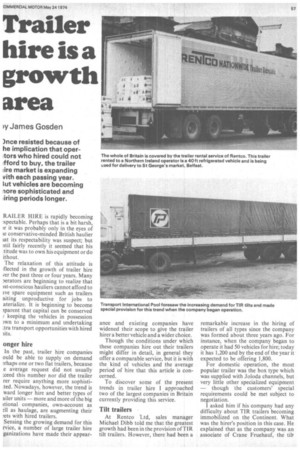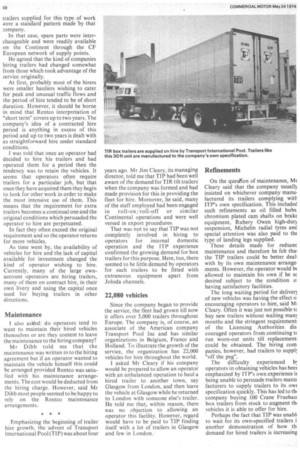Trailer hire is a growth area
Page 59

Page 60

If you've noticed an error in this article please click here to report it so we can fix it.
James Gosden
)nce resisted because of he implication that oper[tors who hired could not [fiord to buy, the trailer tire market is expanding vith each passing year lut vehicles are becoming nore sophisticated and iring periods longer.
RAILER HIRE is rapidly becoming !spectable. Perhaps that is a bit harsh, )r it was probably only in the eyes of le conservative-minded British haulier iat its respectability was suspect; but rail fairly recently it seemed that his titude was to own his equipment or do ithout.
The relaxation of this attitude is .flected in the growth of trailer hire ier the past three or four years. Many )erators are beginning to realize that )st-conscious hauliers cannot afford to ive spare equipment such as trailers aiting unproductive for jobs to aterialize. It is beginning to become )parent that capital can be conserved keeping the vehicles in possession )wn to a minimum and undertaking :tra transport opportunities with hired s.
onger hire
In the past, trailer hire companies ould be able to supply on demand !I.-haps one or two flat trailers, because e average request did not usually :ceed this number nor did the trailer rer require anything more sophisti.ted. Nowadays, however, the trend is ward longer hire and better types of ailer units — more and more of the big itional companies, own-account as tll as haulage, are augmenting their :ets with hired trailers.
Sensing the growing demand for this rvice, a number of large trailer hire ganizations have made their appear ance and existing companies have widened their scope to give the trailer hirer a better vehicle and a wider choice.
Though the conditions under which these companies hire out their trailers might differ in detail, in general they offer a comparable service, but it is with the kind of vehicles and the average period of hire that this article is concerned.
To discover some of the present trends in trailer hire I approached two of the largest companies in Britain currently providing this service.
Tilt trailers
At Rentco Ltd, sales manager Michael Dibb told me that the greatest growth had been in the provision of TIR tilt trailers. However, there had been a remarkable increase in the hiring of trailers of all types since the company was formed about three years ago. For instance, when the company began to operate it had 50 vehicles for hire; today it has 1,200 and by the end of the year it expected to be offering 1,800.
For domestic operation, the most popular trailer was the box type which was supplied with Joloda channels, but very little other specialized equipment — though the customers' special requirements could be met subject to negotiation.
I asked him if his company had any difficulty about TIR trailers becoming immobilized on the Continent. What was the hirer's position in this case. He explained that as the company was an associate of Crane Fruehauf, the tilt trailers supplied for this type of work hvere a standard pattern made by that company.
In that case, spare parts were interchangeable and were readily available on the Continent through the CF European network of supply points.
He agreed that the kind of companies hiring trailers had changed somewhat from those which took advantage of the service originally.
At first, probably most of the hirers were smaller hauliers wishing to cater for peak and unusual traffic flows and the period of hire tended to be of short duration. However, it should be borne in mind that Rentco interpretation of "short term" covers up to two years. The company's idea of a contracted hire period is anything in excess of this period and up to two years is dealt with as straightforward hire under standard conditions.
I was told that once an operator had decided to hire his trailers and had operated them for a period then the tendency was to retain the vehicles. It seems that operators often require trailers for a particular job, but that once they have acquired them they begin to look for other work in order to make the most intensive use of them. This means that the requirement for extra trailers becomes a continual one and the original conditions which persuaded the operator to hire are perpetuated.
In fact they often exceed the original requirement and so the operator returns for more vehicles.
As time went by, the availability of vehicles for hire and the lack of capital available for investment changed the kind of operator wishing to hire. Currently, many of the large own account operators are hiring trailers, many of them on contract hire, in their own livery and using the capital once used for buying trailers in other directions.
Maintenance
I also aslied: do operators tend to want to maintain their hired vehicles themselves or are they content to leave the maintenance to the hiring company?
Mr Dibb told me that the maintenance was written in to the hiring agreement but if an operator wanted to maintain the vehicle himself this could be arranged provided Rentco was satisfied with his maintenance arrangements. The cost would be deducted from the hiring charge. However, said Mr Dibb most people seemed to be happy to rely on the Rentco maintenance arrangements.
Emphasizing the beginning of trailer hire growth, the advent of Transport International Pool (TIP) was about four years ago. Mr Jim Cleary, its managing director, told me that TIP had been well aware of the demand for TIR tilt trailers when the company was formed and had made provision for this in providing the fleet for hire. Moreover, he said, many of the staff employed had been engaged in roll-on/ roll-off or .similar Continental operations and were well versed in export procedures.
That was not to say that TIP was not completely involved in hiring to operators for internal domestic operation and the ITP experience confirmed the growing demand for box trailers for this purpose. Here, too, there seemed to be little demand by operators • for such trailers to be fitted withextraneous equipment apart from Joloda channels.
22,080 vehicles
Since the company began to provide the service, the fleet had grown till now it offers over 5,000 trailers throughout Europe. The company is, of course, an associate of the American company Transport Pool Inc and has similar organizations in Belgium, France and Holland. To illustrate the growth of the service, the organization has 22,000 vehicles for hire throughout the world.
I asked Mr Cleary if his company would he prepared to allow an operator with an unbalanced operation to haul a hired trailer to another town, say Glasgow from London, and then leave the vehicle at Glasgow while he returned to London with someone else's trailer. He told me that, within reason, there was no objection to allowing an operator this facility. However, regard would have to be paid to TIP finding itself with a lot of trailers in Glasgow and few in London.
Refinements
On the question of maintenance, Mt Cleary said that the company usually insisted on whichever company manufactured its trailers complying with ITP's own specification. This included such refinements as oil filled hubs. chromium plated cam shafts on brake equipment, Rubery Owen high-duty suspension, Michelin radial tyres and special attention was also paid to the type of landing legs supplied.
These details made for red ucec maintenance and therefore he felt thal the TIP trailers could be better deal with by its own maintenance arrange. ments. However, the operator would be allowed to maintain his own if he sc desired subject to the condition o: having satisfactory facilities.
The long waiting period for deliver3 of new vehicles was having the effect o. encouraging operators to hire, said MI Cleary. Often it was just not possible te buy new trailers without waiting man3 months and the stringent requirement! of the Licensing Authorities dis couraged operators from continuing te run worn-out units till replacement: could be obtained. The hiring corn panies, however, had trailers to suppl! "off the peg".
The difficulty experienced b: operators in obtaining vehicles has beet emphasized by ITP's own experience it being unable to persuade trailers manu facturers to supply trailers to its owi specification quickly. This has led to till company buying 100 Crane Fruehau box trailers from stock to augment till vehicles it is able to offer for hire.
Perhaps the fact that TIP was unabli to wait for its own-specified trailers i another demonstration of how th. demand for hired trailers is increasing




































































































































